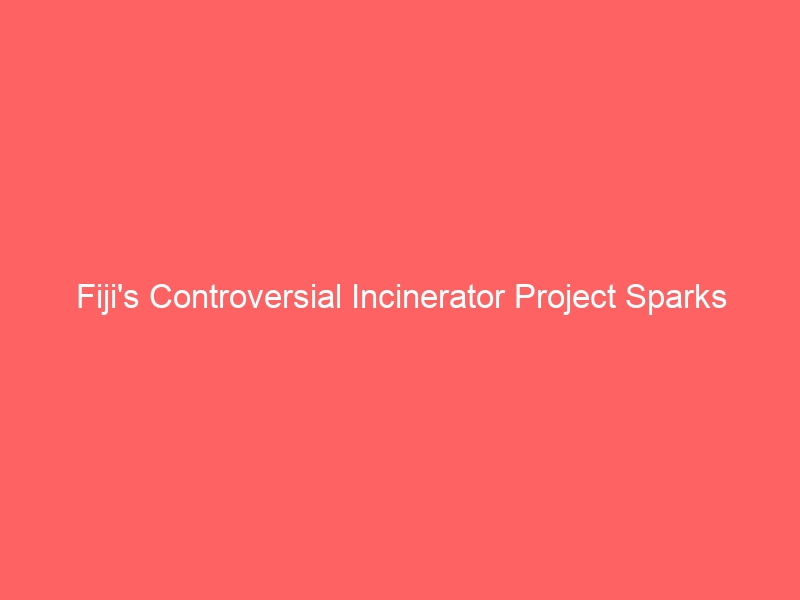Fiji’s Controversial Incinerator Project Sparks Environmental Concerns
The picturesque island nation of Fiji has long been a popular destination for tourists looking to experience its pristine beaches, crystal-clear waters, and lush tropical landscapes. However, recent developments on the island have sparked concerns among environmentalists and locals alike.
The Fiji government has recently announced plans to build an incinerator in the capital city of Suva, as part of a larger waste management project. The incinerator is intended to burn the city’s waste and generate electricity in the process. While the government has touted the project as a step towards modernizing the country’s waste management infrastructure, it has been met with significant opposition from environmentalists and concerned citizens.
The project has raised a number of environmental concerns, including fears of air and water pollution, greenhouse gas emissions, and the impact on public health. In addition, many residents have expressed worries about the potential visual and olfactory pollution that such a facility could create in the area.
Opponents of the project argue that there are more sustainable and environmentally friendly alternatives to waste management that should be explored before resorting to building an incinerator. They point to successful waste reduction and recycling programs in other countries as examples of more effective and environmentally friendly approaches to dealing with the issue of waste.
In response to these concerns, the Fiji government has commissioned a series of environmental impact assessments to evaluate the potential consequences of the incinerator project. However, many environmentalists and concerned citizens remain skeptical of the government’s ability to accurately assess the impact of such a large and complex development.
The controversy surrounding the incinerator project has sparked a heated debate in Fiji, with both supporters and opponents of the project expressing their views through public demonstrations, social media campaigns, and open letters to government officials. The issue has also attracted attention from international environmental organizations, who have voiced their concerns about the potential impact of the incinerator on Fiji’s delicate ecosystem.
Despite the ongoing debate, the Fiji government has remained steadfast in its support of the incinerator project, citing the urgent need for modernized waste management infrastructure and the potential economic benefits of generating electricity from the burning of waste.
As the controversy continues to unfold, it remains to be seen whether the incinerator project will proceed as planned, or if the opposition to the project will force the government to reconsider its approach to waste management in Fiji.
FAQs
Q: What are the potential environmental impacts of the incinerator project?
A: The potential environmental impacts of the incinerator project include air and water pollution, greenhouse gas emissions, and the impact on public health. The burning of waste can release harmful pollutants into the air and water, which can have serious consequences for the environment and public health.
Q: Are there alternative approaches to waste management that could be explored?
A: Yes, there are more sustainable and environmentally friendly alternatives to incineration that should be explored before resorting to building an incinerator. Successful waste reduction and recycling programs in other countries serve as examples of more effective and environmentally friendly approaches to dealing with the issue of waste.
Q: What are the concerns of local residents about the incinerator project?
A: Local residents have expressed worries about the potential visual and olfactory pollution that such a facility could create in the area. Many are also concerned about the potential health impacts of the incinerator on their communities.
Q: What is the government’s stance on the incinerator project?
A: The Fiji government has remained steadfast in its support of the incinerator project, citing the urgent need for modernized waste management infrastructure and the potential economic benefits of generating electricity from the burning of waste.
Q: What steps has the government taken to address the concerns of the opposition?
A: The Fiji government has commissioned a series of environmental impact assessments to evaluate the potential consequences of the incinerator project. However, many environmentalists and concerned citizens remain skeptical of the government’s ability to accurately assess the impact of such a large and complex development.
Fiji’s Controversial Incinerator Project Sparks Environmental Concerns




